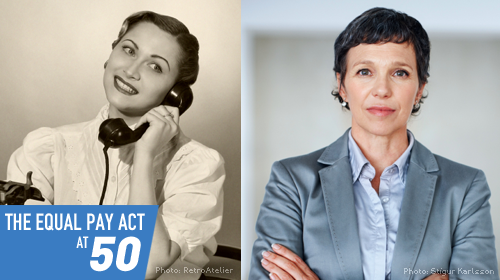
My mom graduated from a prestigious, small women's college in the 1950s with dreams of graduate school – a true accomplishment for a Jewish girl from a modest economic background. She wanted to go to a scholarly graduate school, which would have given her more options, but her college advisor would only write her a recommendation for a teachers' college, steering her into what girls at the time were supposed to do for a living.
Today marks the 50th anniversary of the Equal Pay Act of 1963 – a landmark law that required equal pay for equal work for women for the first time. On this anniversary, I can't help but think about the impact of this law for women like my mom, who were in the workforce before and after its passage.
I am sure a lot of children say this about their moms, but my mom is truly one of the smartest people I have ever met. Unfortunately, she grew up in a time when a woman's talent was almost irrelevant to her earning potential because her options were limited by discrimination and stereotypes.
So she became a teacher, and by 1963, she was teaching English at a state university and making very little money. Later, while my dad, also brilliant and an important force in my life, was studying for his PhD, he wound up teaching for a period of time at the same college as my mom – making 25% more than she did, with less teaching experience.
After a short stint out of the workforce when she had her second child – me – because she could not get reliable child-care, she went back to work, and over the years, had different jobs, but always made less, in professions I am not sure quite fulfilled her.
I often feel sad about the potential she was not given the chance to realize. I also think about the loss for America, because of all the talented, smart women from generations before us whose options were limited. Our society has been short-changed by the constraints on their contributions.
On June 10, 1963, President Kennedy signed the Equal Pay Act. He said that the act was a "first step" which "affirms our determination that when women enter the labor force they will find equality in their pay envelopes." But he noted that "much remains to be done to achieve full equality of economic opportunity."
In the 50 years since the enactment of the Equal Pay Act, a lot has changed for women in the workforce. Inspired by my mom's struggles, I went to law school, became a civil rights attorney, and have been lucky to stand with champions who have fought for better workplace rights for women, like Lilly Ledbetter and Betty Dukes.
But not enough has changed. On average, women still make 77 cents on the dollar that men make – a mere 18 cent improvement since the signing of the Equal Pay Act a half century ago. As a teacher, my mom certainly made a lot less than male-dominated professions, but she also made less than her male teacher peers. Even today, male elementary and middle school teachers earn over 14% more than female teachers, even though women comprise almost 82% of the field. Female college and university teachers earned over 15% less than those who were male. And for me, female lawyers earn 25% less than their male peers – higher than the national average wage gap.
This 50th anniversary is a reminder of how far we have come and how far we have yet to go. Women can enter almost any profession now, and there are equal pay laws on the books. However, as the statistics show, we need new tools to finally close these gaps. In my job, I work for passage of the Paycheck Fairness Act - a bill that would update and strengthen the Equal Pay Act. This bill would help close the wage gap by providing stronger remedies for wage discrimination based on gender equal to those for race discrimination, by prohibiting retaliation against workers who inquire about their employers' wage practices, and by requiring that employers demonstrate that wage differences between men and women doing the same work have a business necessity.
My mother has been my motivation in many ways, and I work for women's rights in large part because of her. If the last 50 years has taught us anything, it is that laws can create an atmosphere where employers understand discrimination is no longer tolerated, but our work is not yet done. As President Kennedy said, the Equal Pay Act was the first step. For our mothers and all the women in our lives, we celebrate its anniversary and continue the fight for equality in our paychecks.
Want to do something about the wage gap? Ask Congress to pass the Paycheck Fairness Act.
Learn more about paycheck fairness and other civil liberty issues: Sign up for breaking news alerts, follow us on Twitter, and like us on Facebook.

